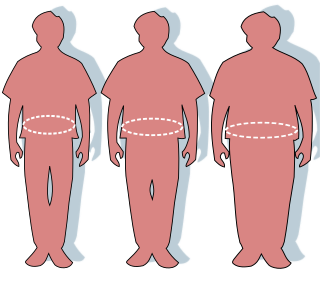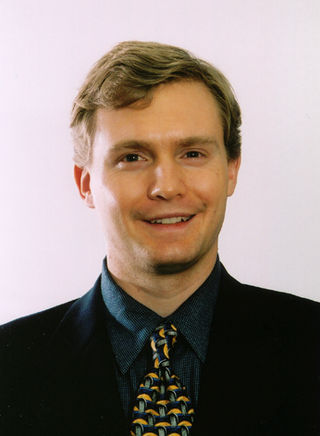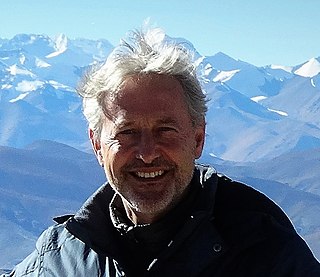Related Research Articles

Obesity is a medical condition, sometimes considered a disease, in which excess body fat has accumulated to such an extent that it can potentially have negative effects on health. People are classified as obese when their body mass index (BMI)—a person's weight divided by the square of the person's height—is over 30 kg/m2; the range 25–30 kg/m2 is defined as overweight. Some East Asian countries use lower values to calculate obesity. Obesity is a major cause of disability and is correlated with various diseases and conditions, particularly cardiovascular diseases, type 2 diabetes, obstructive sleep apnea, certain types of cancer, and osteoarthritis.

A healthy diet is a diet that maintains or improves overall health. A healthy diet provides the body with essential nutrition: fluid, macronutrients such as protein, micronutrients such as vitamins, and adequate fibre and food energy.
The International Food Policy Research Institute (IFPRI) is an international research center focused on agriculture and food systems that provides research-based policy solutions to reduce poverty and end hunger and malnutrition throughout low- and middle-income countries in environmentally sustainable ways. For nearly 50 years, IFPRI has worked with policymakers, academics, nongovernmental organizations, the private sector, development practitioners, and others to carry out research, capacity strengthening, and policy communications on food systems, economic development, and poverty reduction.

William Raymond Steiger is a Public Policy Fellow at the Wilson Center in Washington, D.C.. He served as Chief of Staff at the United States Agency for international Development from 2017 to 2021. Previously, Steiger was the chief program officer at Pink Ribbon Red Ribbon, an organization affiliated with the George W. Bush Institute, which works to reduce deaths from cervical cancer and breast cancer in low- and middle-income countries. He was the Special Assistant to the Secretary for International Affairs and the Director of the Office of Global Health Affairs at the U.S. Department of Health and Human Services (DHHS) during the George W. Bush administration, with a portfolio that included HIV/AIDS, malaria, avian flu and pandemic-influenza preparedness.
Nutrition transition is the shift in dietary consumption and energy expenditure that coincides with economic, demographic, and epidemiological changes. Specifically the term is used for the transition of developing countries from traditional diets high in cereal and fiber to more Western-pattern diets high in sugars, fat, and animal-source food.

Obesity in China is a major health concern according to the WHO, with overall rates of obesity between 5% and 6% for the country, but greater than 20% in some cities where fast food is popular.

Patrick Webb serves as Chief Nutritionist for the United States Agency for International Development USAID. He was Dean for Academic Affairs at Tufts University's Friedman School of Nutrition from 2005 to 2014. In 2024, he was awarded the prestigious 'Jean-Pierre Habicht Lifetime Achievements in Global Nutrition Research' Award by the American Society for Nutrition. He was also listed among the top 2% of highly-cited scientists across all disciplines globally.
Barry Michael Popkin is an American nutrition and obesity researcher at the Carolina Population Center and the W.R. Kenan Jr. Distinguished Professor of Nutrition at the University of North Carolina at Chapel Hill School of Public Health, where he is the director of the Global Food Research Program. He developed the concept of "nutrition transition". He is the author of over 650 journal articles and a book, The World is Fat, translated into a dozen languages.
Mary Story is Professor of Global Health and Community and Family Medicine, and director of Education and Training, Duke Global Health Institute at Duke University. Dr. Story is a leading scholar on child and adolescent nutrition and child obesity prevention.
Lindiwe Sibanda Majele (born 1963) is a Zimbabwean professor, scientist, policy advocate and influencer on food systems. She currently serves as director and chair of the ARUA Centre of Excellence in Sustainable Food Systems (ARUA-SFS) at the University of Pretoria in Pretoria, South Africa as well as founder and managing director of Linds Agricultural Services Pvt Ltd. in Harare, Zimbabwe. She is currently a board member of Nestlé where she is also a member of the Sustainability Committee.
Barbara A. Burlingame is a nutrition scientist specializing in food composition, biodiversity for food and nutrition, sustainable diets and sustainable food systems, and traditional food systems of indigenous peoples. She is involved in nutrition policy development at the global level, and is currently a professor at Massey University.

Line Gordon is a Swedish sustainability scientist whose transdisciplinary research combines food, water, and the benefits people receive from nature. Gordon is the director of the Stockholm Resilience Centre and a professor at Stockholm University, Sweden. She is also on the board of the EAT foundation, and often participates in public discussions of food and climate in Sweden.

The planetary health diet, also called a planetary diet or planetarian diet, is a flexitarian diet created by the EAT-Lancet commission as part of a report released in The Lancet on 16 January 2019. The aim of the report and the diet it developed is to create dietary paradigms that have the following aims:
Amelia A. Lake is a British dietitian who is Professor of Biosciences at Teesside University. She works in public health, and is co-founder of the North East Obesogenic Environment Network (NEOeN). She is concerned about the impact of energy drinks on children's health.
Beatrice Crona is an ecologist, a professor at Stockholm University, and the Executive Director of the Program on Global Economic Dynamics and the Biosphere at the Royal Swedish Academy of Sciences. In 2023 she became a Science Director of the Stockholm Resilience Centre.

Jessica Fanzo is an American scientist. She is a Professor of Climate and Director of the Food for Humanity Initiative at the Columbia Climate School. Prior to joining Columbia in July 2023, she was the Bloomberg Distinguished Professor of Global Food and Agriculture Policy and Ethics at the Johns Hopkins Berman Institute of Bioethics, the Bloomberg School of Public Health, and the Paul H. Nitze School of Advanced International Studies. She was the first laureate of the Carasso Foundation’s Sustainable Diets Prize in 2012 for her research on sustainable food and diets for long-term human health. In 2024, Fanzo was elected a member of the National Academy of Sciences.
William Alan Masters is an American economist, teaching and conducting research on agricultural economics and food policy in the Friedman School of Nutrition at Tufts University, where he also has a secondary appointment in the Department of Economics.
Mario Herrero is a professor of sustainable food systems and global change in the Cornell CALS Department of Global Development. He is also the director of Food Systems & Global Change, a Cornell Atkinson Scholar, and a Nancy and Peter Meinig Family Investigator in the Life Sciences. With a focus on increasing the sustainability of food systems, Herrero has made significant contributions to the field, benefiting both people and the planet.
Catherine Alison Geissler, Lady Auld is a prominent British nutritionist and author and co-author of widely recognised reference textbooks on human nutrition.
Ashley Adamson is a British dietician, Professor of Public Health Nutrition at Newcastle University. She is director of the National Institute for Health and Care Research School for Public Health Research. Her research looks to understand the relationship between nutrient intake, food choices, socio-demographic characteristics and health outcomes. She was made a NIHR Senior Investigator in 2023.
References
- 1 2 "Connecting with the food system – Corinna Hawkes – Food Thinkers". Food Research Collaboration. 2015-03-31. Retrieved 2019-06-27.
- ↑ Hawkes, Corinna (1998). Mediterranean shrub mortality : a field and modelling investigation (PhD thesis). King's College London (University of London). EThOS uk.bl.ethos.300580.
- 1 2 3 4 "Interview with Corinna Hawkes, Honorary Fellow at the City University London Centre for Food Policy". NYC Food Policy Center. 2016-01-29. Retrieved 2019-06-27.
- ↑ "Corinna Hawkes". 2020conference.ifpri.info. Retrieved 2019-06-27.
- ↑ "Professor Corinna Hawkes". EAT. Retrieved 2019-06-27.
- ↑ UCL (2018-05-19). "Corinna Hawkes". NIHR Obesity Policy Research Unit at UCL. Retrieved 2019-06-27.
- ↑ "A new framework for international healthy-diet policies. | Food Climate Research Network (FCRN)". www.fcrn.org.uk. Retrieved 2019-06-27.
- ↑ "Professor Corinna Hawkes - Networks of evidence and expertise for public policy". www.csap.cam.ac.uk. Retrieved 2019-06-27.
- ↑ Hawkes, C.; Jewell, J.; Allen, K. (2013). "A food policy package for healthy diets and the prevention of obesity and diet-related non-communicable diseases: the NOURISHING framework" (PDF). Obesity Reviews. 14: 159–168. doi: 10.1111/obr.12098 . ISSN 1467-7881. PMID 24103073. S2CID 10080718.
- ↑ IFPRI (2018-11-30), Corinna Hawkes, City University of London, UK , retrieved 2019-06-27
- ↑ "Authors". World Economic Forum. Retrieved 2019-06-27.
- ↑ "Foresight Lead Expert Group (LEG) | Global Panel". glopan.org. Archived from the original on 2019-06-27. Retrieved 2019-06-27.
- ↑ "Mayor unveils new London Food Board". London City Hall. 2017-05-03. Retrieved 2019-06-27.
- ↑ "London's Child Obesity Taskforce". London City Hall. 2018-10-22. Retrieved 2019-06-27.
- ↑ "Experts Urge Action Now for Healthier Lifestyles". 2006. doi:10.1037/e569412006-007.
{{cite journal}}: Cite journal requires|journal=(help) - ↑ Kain, Juliana; Thow, Anne Marie; Friel, Sharon; Hammond, Ross A.; Wardle, Jane; Jewell, Jo; Smith, Trenton G.; Hawkes, Corinna (2015). "Smart food policies for obesity prevention". The Lancet. 385 (9985): 2410–2421. doi:10.1016/S0140-6736(14)61745-1. ISSN 0140-6736. PMID 25703109. S2CID 19265795.
- ↑ Healy, Melissa (28 January 2019). "Obesity, climate change and hunger must be fought as one, health experts declare". Los Angeles Times . Retrieved 2019-06-27.
- ↑ "Prof. Corinna Hawkes PhD". EAT. Retrieved 2019-06-27.
- ↑ "Corinna Hawkes". The Conversation. Retrieved 2019-06-27.
- ↑ Merrifield, Andy (2018). What We Talk About When We Talk About Cities (And Love). OR Books. p. 258. ISBN 978-1682191439.
- ↑ Merrifield, Andy (2018). What We Talk About When We Talk About Cities (And Love). OR Books. p. 90. ISBN 978-1682191439.